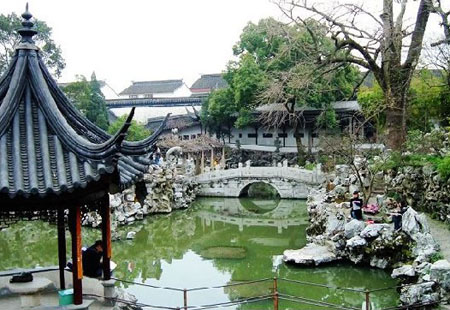
Jiangsu (simplified Chinese: 江苏; traditional Chinese: 江蘇; pinyin: Jiāngsū; Wade-Giles: Chiang-su; Postal map spelling: Kiangsu) is a province of the People's Republic of China, located along the east coast of the country. The name comes from jiang, short for the city of Jiangning (now Nanjing), and su, for the city of Suzhou. The abbreviation for this province is "苏" (sū), the second character of its name. It is the province with the highest population density in China, though provincial level municipalities like Shanghai, Beijing, and Tianjin have a higher density.
Jiangsu borders Shandong in the north, Anhui to the west, and Zhejiang and Shanghai to the south. Jiangsu has a coastline of over one thousand kilometers along the Yellow Sea, and the Yangtze River passes through its southern parts. Since the inception of economic reforms in 1978, Jiangsu has been a hot spot for economic development, and is now one of China's most prosperous provinces. The wealth divide between the rich southern regions and the north, however, remains a prominent issue in the province.
The province of Jiangsu was formed in the seventeenth century from the splitting of the defunct and erroneously named Jiangnan Province ("south of the river") into Jiangsu and Anhui. Before then, the northern and southern parts of Jiangsu had less connection than that later.
Traditionally, South Jiangsu is referred to as the three more prosperous southern cities including Suzhou, Wuxi and Changzhou. Their culture (the "Jiangnan" culture shared with Shanghai and Zhejiang) is more southern than the rest and is oftened referred to as the Wu. All the other parts of the province is dominated by the so-called "Jianghuai Culture", which means the culture in the area between the Yangtse River (Jiang) and Huaihe River (Huai), though not all of them lie within the district defined by the term. In history, the term North Jiangsu refers to the cities to the north of the Yangtze River. For cities of Nanjing and Zhenjiang, neither the two terms (North Jiangsu and South Jiangsu) refers to them, because though they are to the south of the River, culturally they are still of the Jianghuai Region. Since about 1998, there is a new classification used frequently by the government and defined by economic means. It groups all the cities to the south of the Yangtse River as South Jiangsu, the cities of Yangzhou, Nantong and Taizhou as Middle Jiangsu, and all the rest as North Jiangsu.
Though the terms of classification are very complex, by cultural means only the very north cities of Xuzhou and Huaian are culturally north Chinese. All the rest areas of the province are culturally south, though the three South Jiangsu cities are more purely southern while the culture in other cities is more a transitional mixture dominated by the southern.
The Humble Administrator's Garden, one of the classical gardens of Suzhou.Two main subdivisions of the Chinese language, Mandarin (not Putonghua, the national standard speech based on the Beijing dialect, also commonly called Mandarin) and Wu, are spoken in different parts of Jiangsu. Dialects of Mandarin are spoken over the traditional North Jiangsu, Nanjing and Zhenjiang, while Dialect of Wu is used in South Jiangsu. Mandarin and Wu are not mutually intelligible and the dividing line is sharp and well-defined. (See also Nanjing dialect, Xuzhou dialect, Yangzhou dialect, Suzhou dialect, Wuxi dialect, Changzhou dialect). In addition, Standard Chinese (Putonghua/Mandarin) is also spoken by most people.
Jiangsu is rich in cultural traditions. Kunqu, originating in Kunshan, is one of the most renowned and prestigious forms of Chinese opera. Pingtan, a form of storytelling accompanied by music, is also popular: it can be subdivided into types by origin: Suzhou Pingtan (of Suzhou), Yangzhou Pingtan (of Yangzhou), and Nanjing Pingtan (of Nanjing). Xiju, a form of traditional Chinese opera, is popular in Wuxi, while Huaiju is popular further north, around Yancheng. Jiangsu cuisine is one of the eight great traditions of the cuisine of China.
Suzhou is also famous for its silk, embroidery art, jasmine tea, stone bridges, pagodas, and its classical gardens. Nearby Yixing is famous for its teaware, and Yangzhou is famous for its lacquerware and jadeware. Nanjing's yunjin is a famous form of woven silk, while Wuxi is famous for its peaches.
Since ancient times, south Jiangsu has been famed for its prosperity and opulence, and simply inserting south Jiangsu place names (Suzhou, Yangzhou, etc.) into poetry gave an effect of dreaminess, as was indeed done by many famous poets. In particular, the fame of Suzhou (as well as Hangzhou in neighbouring Zhejiang province) has led to the popular saying: 上有天堂,下有蘇杭 (above there is heaven; below there is Suzhou and Hangzhou), a saying that continues to be a source of pride for the people of these two still prosperous cities. Similarly, the prosperity of Yangzhou has led poets to dream of: 腰纏十萬貫,騎鶴下揚州 (with a hundred thousand strings of coins wrapped around the waist, riding a crane down to Yangzhou).
Nanjing was the capital of several Chinese dynasties and contains a variety of historic sites, such as the Purple Mountain, Purple Mountain Observatory, the Sun Yat-sen Mausoleum, Ming Dynasty city wall and gates, Ming Xiaoling Mausoleum (The mausoleum of the first Ming Emperor Zhu Yuanzhang), Lake Xuanwu, Jiming Temple, the Nanjing Massacre Memorial, Nanjing Confucius Temple, Nanjing Yangtze River Bridge, and the Nanjing Zoo, with circus. Suzhou is renowned for its classical gardens (designated as a UNESCO World Heritage Site), as well as Hanshan Temple, and Huqiu Tower. Nearby is the water-town of Zhouzhuang, an international tourist destination where Venice alike waterways, bridges and dwellings have been preserved over centuries. Yangzhou is known for Thin West Lake. Wuxi is known for being the home of the world's tallest buddha statue. In the north, Xuzhou is designated as one of China's "eminent historical cities". The official travel and tourism website for Jiangsu was set up in 2008.









0 comments:
Post a Comment